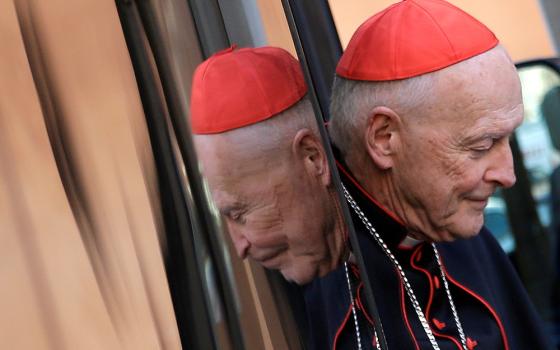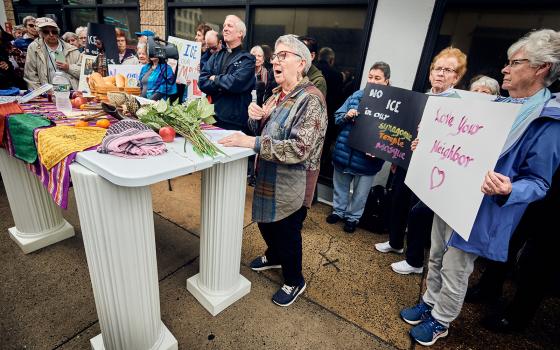
The scene from a rooftop at a May 6, 2023, protest in Curitiba, southern Brazil state of Paraná, where Fr. Joaquim Parron and his order of the Redemptorist Fathers joined in solidarity with homeless families (RNS/Courtesy of Joaquim Parron)
In early 2023, Fr. Joaquim Parron, a Redemptorist priest in Curitiba, in southern Brazil, rushed to a sprawling encampment outside the city where more than 200 destitute families were squatting on private land. Parron had gotten word that police had surrounded the settlement and had begun dumping residents' belongings on the street before razing their homes.
Parron convinced the police to let him and a few members of his team into the settlement. "It was terrible," he recalled. Children, he said, watched from behind piles of clothes and housewares as bulldozers crushed the makeshift houses. "People who didn't have a place to live lost the last hope they had for dignified living."
Parron negotiated for the families to be released from the police cordon so they could be transported to another settlement, also on land belonging to a landowner. "I came back at the end of the day, when everything had finished," sighed Parron, "and I said, 'I lost today.' "
Scenes like this used to be more common than they are today, thanks to human rights advocates who campaigned over the years for better treatment for the residents of favelas, informal settlements on private or government-owned land in Brazil. Their work, alongside advocacy from within Brazilian government and judicial agencies, resulted in the launching of a 2019 pilot mediation program in the state of Paraná, of which Curitiba is the capital. Its success led to a 2021 Supreme Court decision that requires every state in Brazil to develop a similar program.

Fr. Joaquim Parron, left, and members of his team from the Congregation of the Redemptorist Fathers load baskets of practical goods for destitute families on the outskirts of Curitiba, Paraná, southern Brazil, Sept. 12, 2023. (RNS/Courtesy of Joaquim Parron)
But the causes of the housing crisis continue. Between 2008 and 2013, rental costs in Brazil exploded, rising by 95% in São Paulo and 132% in Rio de Janeiro. COVID-19 exacerbated the rent increases in low-income neighborhoods, forcing many to build tin and plywood or cardboard shacks on the periphery of the country's major cities. The favelas have existed since the 19th century, but what were once temporary answers to housing shortages have become permanent communities. In 2023, the latest year for which data is available, they were home to more than 16 million people.
The owners of the occupied areas have increasingly fought back by filing lawsuits to reclaim their property. Residents of the favelas were often unaware that a lawsuit had been filed until state police appeared to forcibly remove them.
In September 2023, as part of the Harvard Negotiation and Mediation Clinical Program, I worked as a Dispute System Designer with a small team tasked with expanding Paraná's mediation program to the national level. We navigated questions of how to tailor programs to the needs of different regions and how to train federal judges who would be acting as mediators.
But while the legal processes for resolving these conflicts evolve, the constant has been the role of priests like Parron, who cultivate trust between communities and the legal process.
"I always believed that I was ordained for this," said Fr. Dirceu Fumagalli. The son of peasant farmers, Fumagalli knew that his ministry would somehow be tied to the land. "It was my commitment: I came from the fields, so I should contribute back through the fight for rural workers and the movement of direct struggle for land." He has worked with the National Land Commission since 1986, after completing seminary in his early 20s.
Parron also began his ministry while still studying to be a priest with the Congregation of the Redemptorist Fathers, an order dedicated to working among impoverished communities. "From them, I got this consciousness that the religion, the church, should be a way to help them get dignity," he said.
This work led him in many directions — including to jail, for intervening during violent evictions in Paraná. In the morning, he teaches social ethics at the Catholic University in Curitiba. In the afternoon, he travels to visit the favelas on the city's periphery.
Both priests work to provide a sense of security for both sides, lowering the chance of physical violence from the state and the community alike.
Fumagalli remembered arriving in 2021 at a rural settlement near Curitiba on land owned by a private entity. Though home to about 60 families, the community's effective authorities were drug traffickers, who were hardly eager to receive him. Distrust ran deep, especially between the traffickers and the representatives from the state's recently established Commission of Land Disputes, who had come to resolve the tense legal dispute in which officials and residents had been locked for months.
"They were all extremely prepared to dissolve the meeting," said Fumagalli, but as the priest talked, the parties began to listen.
Advertisement
While the community expects an authoritative presence from the police and government, the Catholic Church is seen as a trustworthy broker. "My presence disarms them," said Fumagalli.
The priests also provide a kind of moral security for the occupants, who may worry that their actions were not only a legal transgression, but a spiritual one. "There were a lot of conversations that this [the occupations] was a sin," Fumagalli explained. "Our presence as pastoral agents," he said, offered a certain amount of security "that they were doing the right thing."
Fumagalli and Parron's work is less about making speeches, presenting arguments or offering solutions, but rather providing a "symbolic presence of a facilitator." According to Fumagalli, "The church, the priest, is not a party involved in the mediation process. But we have a presence. We are a moral catalog for the communities."
That position, Parron explained, comes from living among the community, eating with them, having a coffee, staying all day long, before even attempting to hold a meeting.
In Parecidinha, an urban settlement of about 700 families in Londrina, Paraná, Fumagalli had been meeting with community leaders long before COVID-19 hit and then continued to show up, organizing food deliveries and training in how to advocate for agrarian reform.
When the opportunity for mediation arose, both the occupiers and landowner were wary, but Fumagalli was able to leverage all these contacts to organize a meeting. On the appointed day, the landowner was afraid of facing the occupiers. "I'll never forget that the owner said, 'If the priest goes with me, I'll go,' " Fumagalli recalled.
In Brazil, the political scene has become deeply divided between the socialist left now in power and a populist right. Parron is concerned that the rhetoric and influence of the latter will convince Brazilians that the displaced populations are not vulnerable, but lazy. But he remains steadfast. "These people have a right to a home," he said. "This is justice for us, but in the law of Brazil, even if the land is not in use at all, the law sees it as robbery."
Parron holds Bible services in the favelas, prompting dialogues about justice and respect for impoverished people. "I say to them: 'Listen, God wants you to have dignity, and God is on your side. If the Lord is on your side, and you trust in him, you can organize among yourselves to fight for your rights,' " he explained.
Earlier in his career, he received calls every day from communities asking for help. Seeing a need for training, he prepared a self-advocacy course. Now, he is impressed by how organized people have become. "My work is not only to be on their side, but to prepare them to be leaders, to fight for their own rights without needing a priest," he said.
He hopes that the coming years will help shift the dialogue within Brazilian society. "We need to have more solidarity, more sharing, more education. My faith has to ride for justice, to help people, not to exploit them."





